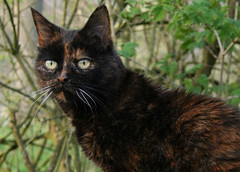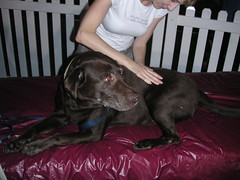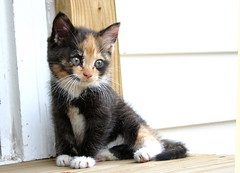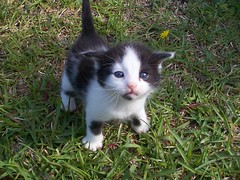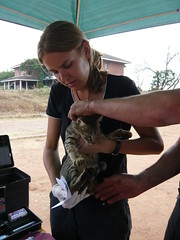 My friend Pamela who traps feral cats in the Seattle area sent me this story. She was contacted by a woman in New York who manages a small feral colony that she was having to move. There was one cat left who she just could not trap. The poor kitty, Patches, was also very sick and suffering. Pamela suggested bringing Patches’ buddy, Checkers, back to the site so she would come to him. Through Pamela’s advise, she was able to catch her and humanely end her suffering. Checkers and the other cat from the feral site are happily in a new home.
My friend Pamela who traps feral cats in the Seattle area sent me this story. She was contacted by a woman in New York who manages a small feral colony that she was having to move. There was one cat left who she just could not trap. The poor kitty, Patches, was also very sick and suffering. Pamela suggested bringing Patches’ buddy, Checkers, back to the site so she would come to him. Through Pamela’s advise, she was able to catch her and humanely end her suffering. Checkers and the other cat from the feral site are happily in a new home.
Many people like Pamela have dedicated their lives to helping feral cats with TNR (trap/neuter/release) and food. TNR is the best method of reducing the number of unwanted kittens that end up in the shelters each year and it works! Here is some good information on feral cats and TNR from the ASPCA, Feral Cat FAQ. Also check out Ally Cat Allies’s informative website on feral cats.
Below is the letter Marilyn, the feral trapper from New York, wrote to Pamela:
Thank you so very much for the suggestion about taking Checkers back to Patches in a carrier. I was so upset thinking about it – woke up in middle of night with an asthma attack, but by this morning, just tried to function on “auto pilot”. It looked like rain too, and I had to hurry…. just asked for and starting feeling the guidance from God….what i usually do, but lost sight of it for awhile lately.
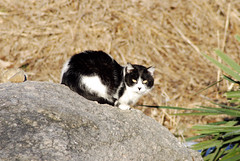 I went in pen this morning… they are so happy in there—Checkers can’t stop head-butting Softy…she must have a headache by now. Checkers was Patches (the one left behind with bad eyes) mate. He’s pretty mellow, so i was able to entice him in the big carrier with a small dish of his favorite can food in the back of carrier pretty easily and close the door quick…. He wasn’t happy about it. I enclosed the carrier in a HUGE heavy-duty black plastic bag I use from Home Depot. they’re excellent for cat rescue – 3 ML strong. and huge. I had about 12” extra bagging left in front of carrier.
I went in pen this morning… they are so happy in there—Checkers can’t stop head-butting Softy…she must have a headache by now. Checkers was Patches (the one left behind with bad eyes) mate. He’s pretty mellow, so i was able to entice him in the big carrier with a small dish of his favorite can food in the back of carrier pretty easily and close the door quick…. He wasn’t happy about it. I enclosed the carrier in a HUGE heavy-duty black plastic bag I use from Home Depot. they’re excellent for cat rescue – 3 ML strong. and huge. I had about 12” extra bagging left in front of carrier.
threw him the back seat, he’s screaming….had to go feed other colony first…make it real quick. Drove the colony where now, my Patches is the only one left. I think that’s what was breaking my heart the most…. there used to be 4 of them (1 died x-mas wk.) Killed me to see her waiting alone. I took Checkers out in the covered carrier — set it down by the feeding station behind the dumpster. she heard him meowing and crying…. she was running around… i did what you said, butted FRONT door of carrier up to BACK of trap with her favorite canned food in back of trap, the extra plastic bagging covering the back and trap and front of carrier (like a tunnel) which you said.
at first she was running all around…. i drove off for 5 min. because she doesn’t like me around. i know she had no interest in the food, it was CHECKERS that made her go in….THANK GOD i drove back to check in less then 5 min. because an auto body guy was over there DISTURBING THE PROCESS LOOKING….. i asked nicely to please step away from the area, i was trying to get a sick cat. he did
within 2 min. of him leaving, i thought i heard the trap door close….YES, patches went in, God bless her soul.
of course i was hysterical all the way to the ER vet, who said they help since she was a stray. naturally , the nice woman i was speaking to for days about this, wasn’t in today. the woman at the desk almost gave me a hard time—but backed off. i was hysterically crying. she said an “exam” would cost $95! at one point she got nasty and said IS THIS YOUR PET??? i felt like saying, yeah right lady! my pet in THIS SHAPE IN A TRAP???FOR CRYING OUT LOUD??? because this place WILL take care of very sick and dying strays for low cost of nothing.
i asked if a vet tech could maybe assess her eyes thru the trap…. a nice tech came out and looked at Patches eyes….she did say she lost most her vision was very poor, waving her hands in front of her eyes…. PLUS, no way i cold medicate her, can’t handle her. I said she needed to be at rest. then i went nuts when they took her in the back…. this tech was very sympathetic – very nice… she came back 3 min. later and said she was sleeping nice under sedation, and she was able to look in her mouth and said her mouth was bleeding and she lost most of her teeth. My Patches was suffering more than I realized. I’m relieved her suffering is over and she’s at peace, but still very in shock and upset. i took Checkers back to the pen, he was so happy to be back…..
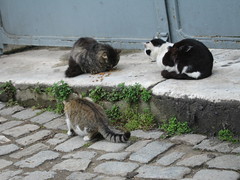 i just want to thank you so very much for all your advice with this…. If not for YOU telling me about taking checkers there in the carrier, although me and him didn’t want to….. i NEVER would’ve gotten Patches…. I KNOW Checkers was the only reason she went in the trap…. she’s at peace now with God…no more horrific suffering for my precious angel. This will hit me later…. I feel wheezing coming on now…. asthma attack from my nerves.
i just want to thank you so very much for all your advice with this…. If not for YOU telling me about taking checkers there in the carrier, although me and him didn’t want to….. i NEVER would’ve gotten Patches…. I KNOW Checkers was the only reason she went in the trap…. she’s at peace now with God…no more horrific suffering for my precious angel. This will hit me later…. I feel wheezing coming on now…. asthma attack from my nerves.
Thank you very much again dear friend from the other side of the country…..for being such a very, very awesome person, and helping me so very much to help these cats to stop their horrific suffering, when no one here would help! It was only because of what you told me to do, that ended my baby’s suffering today.
Love and Hugs, Marilyn
 My good friend Pamela made the news while I was away. Here is the story and news clip, Seattle woman helping feral cats.
My good friend Pamela made the news while I was away. Here is the story and news clip, Seattle woman helping feral cats. 







